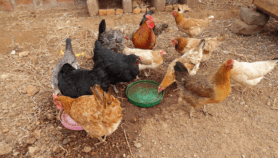By: Sanjit Bagchi
Send to a friend
The details you provide on this page will not be used to send unsolicited email, and will not be sold to a 3rd party. See privacy policy.
Researchers have unveiled a safe and effective treatment for pregnant women suffering from malaria in West Africa.
Trials carried out in Ghana showed that treating pregnant women with the drug amodiaquine, either alone or in combination with sulphadoxine-pyrimethamine (SP), can almost completely wipe out malaria parasites without causing any serious side effects.
The study was published in The Lancet last week (14 October).
In Africa, malaria is a threat to both mothers and their babies, with up to 200,000 newborn deaths each year as a result of malaria during pregnancy.
Harry Tagbor of St. Theresa’s Hospital in Nkoranza, Ghana, and co-workers studied 900 pregnant women at the hospital who carried the malaria parasite and were in their second and third trimester of pregnancy.
They gave each woman either chloroquine, SP, amodiaquine, or a combination of amodiaquine and SP, and then assessed the women for 28 days.
If the levels of parasites in their blood increased, the drugs were deemed to have failed and the women were given treatment to rid them of the parasites. The drugs were also deemed to have failed if a woman still had parasites in her blood on the last day of the study.
This happened in 14 per cent of women who were given chloroquine, 11 per cent for those who were given SP and three per cent for those who received amodiaquine.
None of those given the combination of amodiaquine and SP had any parasites by the end of the study.
“Amodiaquine has been used extensively in Africa, especially in francophone Africa, for the treatment of malaria with few reports of serious adverse effects,” says Tagbor.
He says that until artemisinin-based treatments — recommended by the World Health Organization (WHO) for non-pregnant adults — are shown to be safe in pregnant women, amodiaquine and SP could be “a safe and cheap alternative”.
Bikram Saha, assistant professor of medicine at the North Bengal Medical College Hospital in Darjeeling, India, says the combination could be useful in all developing countries where the malaria parasite is resistant to chloroquine.
But he adds that further studies are needed to assess the risks of the combination treatment.
The WHO currently recommends that pregnant women living in high and moderate-risk areas are treated with SP.
Link to full paper in The Lancet*
*Free registration is required to view this article.
Reference: The Lancet, 368, 1349 (2006)













